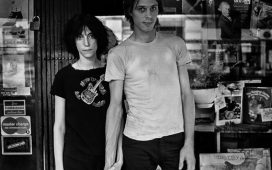The upshot of “RuPaul’s Drag Race” becoming an internationally franchised pop phenomenon is that drag performance has firmly moved from the LGBTQ fringes into the mainstream: As an artform with an audience that now spans all demographics, it follows that it will become more inclusive on stage too. That’s the driving moral, at least, of “Dancing Queens,” a chipper, youth-targeted Swedish comedy that, in more ways than one, encapsulates the cultural broadening of drag in the post-RuPaul era.
Actor-turned-filmmaker Helena Bergström brings sequined cheer and free-to-be-you-and-me spirit to this story of a young, cisgender female dancer who gets an unlikely break by concealing her gender identity to perform in an ailing Gothenburg drag club, and it should duly find a sizable global audience when it premieres on Netflix at the outset of Pride month. In its eagerness to please, however, the film winds up pushing its own queer characters and narratives to the sidelines — a paradox that it never quite resolves.
The relative edgelessness of “Dancing Queens” comes as a disappointment from Bergström, best known to international audiences as the onscreen half of one of modern Swedish cinema’s essential partnerships: With her filmmaker husband Colin Nutley, she headlined a series of 1990s arthouse hits (“House of Angels,” “The Last Dance,” “Under the Sun”) that wryly probed the country’s social mores and sexual politics. Nutley serves as an executive producer on “Dancing Queens,” though the tangy irony of his and Bergstrom’s past glories isn’t much in evidence. Keeping things comfortably in the family, their daughter Molly Nutley assumes leading lady duties here, and to better effect: Her fresh, quietly controlled screen presence saves many a scene from outright schmaltz.
She has a hard task, however, finding many corners or creases in the character of Dylan, a heroine depicted from the outset as a straightforwardly good girl who Just Wants To Dance. We first encounter her tending to the grave of her recently deceased mother (also a dancer, played in gilded flashblacks by Ellen Lindblad), singing a lilting rendition of Whitney Houston’s “I Wanna Dance With Somebody” under her breath. We then cut to her working her dual jobs, running deliveries for her father’s grocery store in a quaint Bohuslän fishing village and offering high-energy dance classes to local moppets. Clearly, she has channeled her grief into a life lived predominantly for others.
Dylan’s plucky grandmother (Marie Göranzon) wants Dylan to pursue her (and her mother’s) dreams of dancing for a bigger audience, and chides her into heading to Gothenburg to audition for a major modern dance company. The audition doesn’t come to pass, but through a decidedly unconvincing chain of events, Dylan is persuaded to take a job cleaning at hard-up drag club Queens, where a power struggle is under way between star performer Tommy (Claes Malmberg), an old-school queen who favors cheesy ’70s disco routines, and hip young choreographer Victor (Fredrik Quiñones), who sees no reason why Dylan can’t be the new queen on the block. Hiding her gender from everyone else at the club, they develop a slinky, crowd-pleasing new act.
From this hokey premise — built from equal parts “Flashdance,” “Burlesque” and “Yentl,” minus their collective camp value — “Dancing Queens” goes nowhere especially surprising, and at nearly two hours, takes its sweet time in doing so. Separate from her gradually fulfilled terpsichorean ambitions, and despite Nutley’s unforced charm, Dylan remains a bit of an empty vessel: Save for her strictly platonic friendship with Victor, there’s little in the way of a personal arc to supplement her predictable career progress.
The story’s most significant tensions, meanwhile, play out in various subplots between its secondary gay characters, all of whom are reduced to stock figures. Specifically queer dynamics of inter-generational friction, relationship insecurities and the anxiety of coming out are all handled in extreme précis form away from the film’s center, without imperiling its consistent, wholesome sexlessness: Even the dancing never threatens to get dirty.
There’s an interesting film to be made about women cracking the drag scene, shuffling through complex layers of gender identity and identification, but this innocuous feel-good trifle hasn’t exactly found it. When, left alone in the club one night, our heroine busts out some spontaneous moves to Gloria Gaynor’s immortal “I Will Survive,” we don’t feel the appropriate euphoria: Where the greatest drag queens genuinely make you believe they are lipsyncing for their lives, Dylan’s survival has never seemed in doubt.








